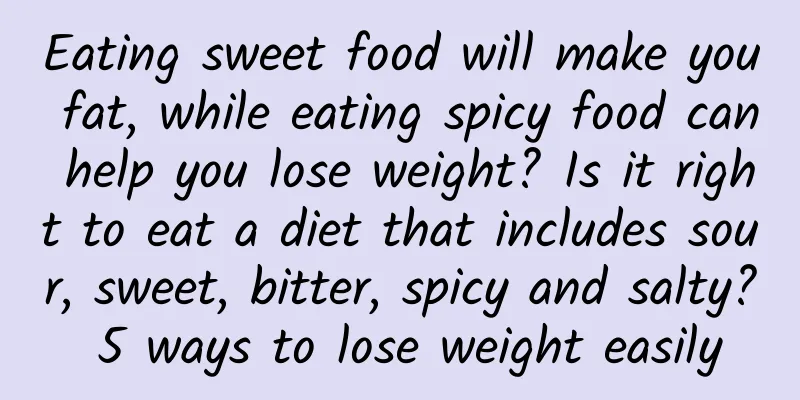Exercising too much or having a protruding belly? Nutritionists recommend how to supplement fiber to get rid of a "big belly"

|
Every summer when I go to the beach, I always envy the young girls with their flat and firm waists, but when I look down at my own belly, I find it is always round. How can I meet guests like this? I go to the gym whenever I have time, and I do running and weight training, but I can’t get rid of the obvious bulge in my belly… If you want to have a flat belly, in addition to exercise, you also need to maintain good intestinal health. If your bowel movements are smooth, you will naturally not have a "big belly"! However, if you want to get rid of constipation, you can't just eat a lot of lettuce salads and vegetable hotpots. You also need to combine these points! Constipation is not only caused by not defecating for a long time, but also by hard stool and straining during defecation. Many people think that if they don’t have a bowel movement for one day, they are constipated, and they immediately become anxious like an ant on a hot pan, eating a lot of fruits and vegetables, and even going to the pharmacy to buy laxatives, hoping to stimulate bowel movements as soon as possible. In fact, there is no need to be particularly nervous if you do not have a bowel movement for a day. First check whether you have the following points: 1. Fewer bowel movements per week, or no bowel movement for more than 3 days 2. Daily stool volume is less than 35 grams 3. The stool is very hard and requires a lot of effort to pass If your bowel movements are less frequent but regular (between 3 times a day and once every 3 days are both within the normal range), and the daily volume is about 100 to 200 grams, then this is considered normal bowel movements and you don't need to be too nervous. In addition to insufficient fiber, insufficient water intake, lack of exercise, and high stress levels can also cause constipation. There are many reasons for constipation, not just diet. Lifestyle habits, emotions, diseases, and medications can all lead to constipation:
Dietary fiber is like the steel skeleton of stool. Adequate intake every day can help stool take shape, pass through the intestines more easily and reduce the time it stays in the intestines. This way, water will not be excessively reabsorbed, causing the stool to become dry and hard and more difficult to excrete. Healthy adults should consume 25 to 35 grams of dietary fiber every day. However, according to the last "National Nutrition and Health Status Change Survey", the average national dietary fiber intake is about 14 grams, which is less than half of the recommended intake. It is no wonder that the number of people suffering from constipation is increasing.
Dietary fiber absorbs water very well. Insufficient water intake will cause dry and hard stools, aggravating constipation. Therefore, don’t forget to drink water while taking in enough dietary fiber. It is recommended to drink 30-40 ml of water per day equal to your body weight.
Office workers who sit for long periods of time, have no regular exercise, have little activity, or are bedridden for a long time will all suffer from insufficient gastrointestinal motility, further causing constipation.
Healthy adults should have the urge to defecate regularly, usually in the morning or after meals, and should be able to defecate easily and effortlessly at this time. However, if you often ignore the urge to defecate and hold it in, your body's defecation reflex may become disordered over time. This is why many people who suffer from constipation do not feel the urge to defecate even if their stomachs are full of poop.
As we age, coupled with reduced activity and appetite, the intestinal motility will gradually decline, and the amount of feces formed will naturally decrease. As the amount of feces decreases, the demand for gastrointestinal motility will also decrease, and this vicious cycle will make constipation more likely. Want to get rid of constipation? Read below to see how nutritionists supplement fiber Dietary fiber is divided into "water-soluble dietary fiber" and "water-insoluble dietary fiber". Both are indispensable for maintaining good health, but which one should you choose if you want to improve constipation? Water-soluble dietary fiber:
Insoluble dietary fiber:
If you want to improve constipation, you should also pay attention to the following 5 good habits 【Tips for improving constipation】 1. The staple food is mainly non-refined whole grains and root vegetables 2. Drink body weight x 35 ml of water every day 3. A high-fiber diet should be adopted gradually. Do not increase fiber intake suddenly to avoid bloating. 4. Maintain regular exercise 5. Develop good bowel habits |
<<: No time to lose weight slowly! Two cousins reduced their stomachs and lost 110 kg
>>: It’s hot, so I’m going to eat some? Drink these "fat-removing" teas to get rid of your fat belly
Recommend
What are the symptoms of uterine fibroids and how to treat them?
The uterus is the source of menstruation and the ...
Is it normal to have brown discharge during ovulation?
Is it normal to have brown discharge during ovula...
Small habits can cause big troubles with dysmenorrhea
During menstruation, women always experience pain...
Is a 3 cm cyst on the left ovary serious? What harm does it do to women?
Left ovarian cyst refers to a cystic mass in the ...
Don’t stock up on meat in autumn! 4 types of food you can eat safely without gaining weight
The weather has been getting cooler recently, and...
Can Western medicine hospitals treat functional uterine bleeding?
Functional uterine bleeding, also known as DUB, i...
What do you need to bring to the hospital for an abortion? What do you need to bring to the hospital for an abortion?
What do I need to bring to the hospital for an ab...
What are the causes of acute cervicitis?
Generally speaking, the incidence of acute cervic...
Pay attention to the postoperative care of these ectopic pregnancies
Ectopic pregnancy mainly refers to the symptoms t...
Do you know what the symptoms of cervical hypertrophy are?
How much do you know about the symptoms of cervic...
A way to regulate menstruation for those with weak constitutions
The patient is physically weak, has poor appetite...
Causes and coping strategies for abdominal bloating after miscarriage
🌟Abortion is a common condition among female frie...
Is cervical precancerous lesions caused by cervical HPV infection?
With antibiotics, bacteria can be killed, but the...
How much do you know about the dangers of uterine fibroids?
Uterine fibroids, as the name suggests, are a typ...
Precautions for uterine effusion
What are the precautions for uterine effusion, wh...









